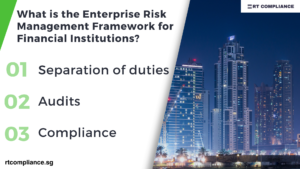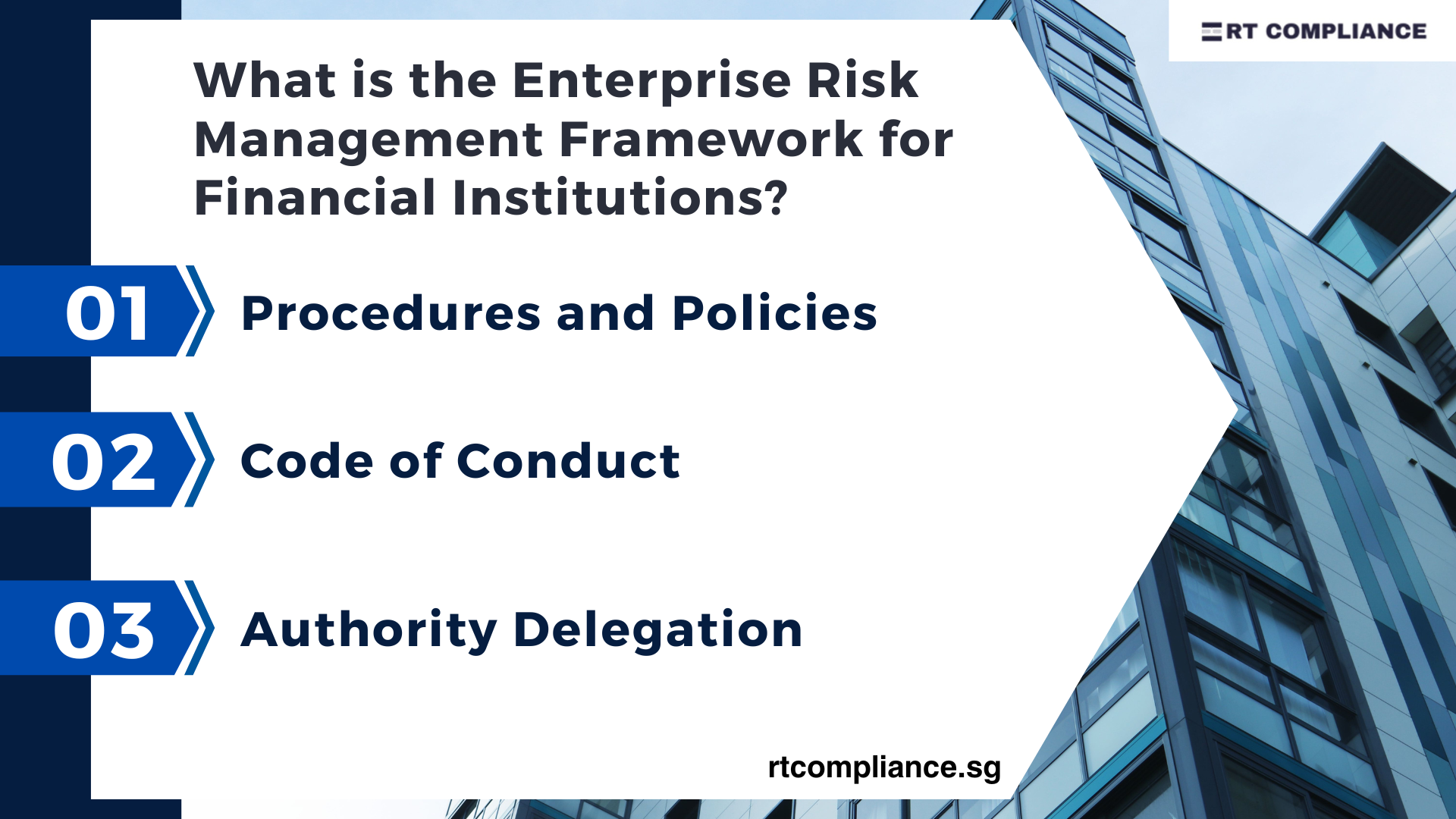Enterprise Risk Management (ERM) Framework for Financial Institutions in Singapore
The Enterprise Risk Management (ERM) Framework for Financial Institutions in Singapore, as stipulated by the Monetary Authority of Singapore’s requires that boards and executives adopt systems, practices, and procedures to ensure conformity with regulatory requirements for financial institutions. This ERM framework enhances operational efficiency and legal compliance while strengthening overall risk identification, assessment, and mitigation. An excellent internal accounting controls scheme is a core component of a sound risk management framework for financial institutions in Singapore, helping institutions effectively manage operational, market, and credit risks.
Control Environment
Procedures and Policies
- For each financial Institutions organization, board-approved risk management policies are needed.
Code of Conduct
- To carry out its operations with honesty and prudence, a controlled institution must enforce a code of ethics.
- The ethical principles of the institution must be included in this code of ethics, as well as personnel guidance.
Authority Delegation
- Each controlled agency shall determine the levels and obligations of authority required for various types of exposures and events.
Separation of duties
- To defend against illegal transaction risk, data exploitation for irregularity, secrecy or personal benefit, and economic damages, an institution’s obligation segregation must be necessary.
Audits
- An Audit Committee is in charge of overseeing the audit function.
- The Board must ensure that the representatives of the Audit Committee are eligible to perform their duties.
Compliance
- To emphasize the value of the enforcement function, an agency should assign senior personnel to oversee compliance issues.
Leave of Absence
- An institution can oblige staff in risk assessment, risk prevention, or risk-taking roles to take at least 5 consecutive business days off per year.
- Employees on involuntary leave must not be allowed to carry out directives, do business, or conduct their assigned tasks while on leave.
Taking Care of Complaints
- The organization must take steps to ensure that daily complaint reports are handled in a timely, equitable, and consistent manner.
Compensation for employees
- An institution’s compensation programs must attract and maintain veteran employees. However, bonuses cannot be granted inadvertently for unwanted tasks.
Recruitment
- Potential candidates must undergo satisfactory screening for honesty, technical credentials, expertise, and reputation through recruitment Financial institutions.
Staff Education and Training
- Employees must be up to date with emerging products, as well as improvements in rules and laws. To increase their efficacy, they should receive proper instruction.
Business Process Controls
Customer Handling
- Financial Institutions should have specifically published, Board-approved rules on customer handling as well as risk disclosures.
Policies on Operation Accounts
- Regulated agencies must have active monitoring in place to ensure that account closures and openings are appropriately authorized.
Legal Documentation
- Formal arrangements with counterparties and clients of an agency must spell out each party’s roles and duties.
Accounting and Recordkeeping
- Each controlled institution must have adequate controls on recordkeeping procedures, such as accounting for the off-balance sheet as well as on-balance sheet liabilities and properties.
Management of Information Systems
- Financial institutions must provide good management information systems to control and handle any aspect of their activities.
Physical Controls
- An institution’s cash-in-transit, as well as a place of operation, must provide adequate physical controls.
After-Hours and Off-Premises Trading
- An institution’s processes and regulations must explicitly specify when after-hours as well as off-premises trading is permitted.
New product lines, services, or activities
- New product regulations are needed for the organization better to determine the inherent hazards of new market practices or lines.
Asset Valuation
- Asset valuation can be conducted rationally and independently using consistent processes and policies.
- Each organization must have controls and policies in place to deal with the risks that come with illiquid positions.
Verification and Reconciliation
- Any institution should have reconciliation and authentication processes in place to ensure the integrity of transaction records and operations.
Confirmation
- An institution’s protocols and systems must provide prompt transaction confirmation.
Settlement
- The institution’s systems must provide basic settlement orders.
- After receiving proper authority from counterparties or clients, the Board must review amendments to these orders.
Types of Risk Address in the ERM Framework
Major categories of risks that are applicable to financial institutions in Singapore should be covered by a strong Enterprise Risk Management Framework as listed below:
1. Operational Risk Management Framework
Errs of internal systems failures, human errors, or outer events on operations.
2. Credit Risk Management Framework
Concentrates on the risks lenders or counterparties fail to perform the obligations.
3. Market Risk Management Framework
Guard against the risks incurred through changes in the interest rate, foreign exchange and asset prices.
4. Liquidity Risk Management Framework
Makes It possible for the institution to honor its demands within a shorter span of time, without having to make unacceptable losses.
5. Regulatory Compliance Risk
Ensures that MAS regulations and the risk management guidelines in the financial sector of Singapore are in congruence, continuously.
How to Implement the ERM Framework in Singapore Financial Institutions
Step 1: Conduct a thorough risk assessment across all departments.
Step 2: Establish internal controls aligned with MAS ERM guidelines.
Step 3: Implement ongoing risk monitoring and compliance audits.
Step 4: Integrate ERM with business strategy for improved decision-making.
Step 5: Build a risk-aware culture through training and education programs.
Implementing an enterprise-wide risk management framework not only improves decision-making but also builds trust with regulators, stakeholders, and customers in Singapore’s financial industry.






